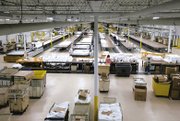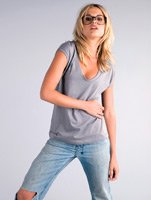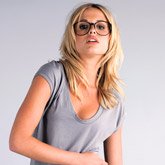Blanks Producers on a Growth Track
American Apparel may have pioneered the fashion blank, but in its wake, it spawned a sub industry of competitors that are now making inroads and are expanding their businesses despite a lingering recession.
These producers have been capitalizing on the growing demand for embellished fashion tees fueled by brands such as Ed Hardy and Affliction. Conversely, there has also been growing demand for affordable logo-less apparel, which has enabled companies such as American Apparel and Alternative Apparel to grow their retail businesses.
In addition, advancements in digital technology—along with the proliferation of Web sites such as CafePress.com, Zazzle.com and Spreadshirt (www.spreadshirt.com)—have eased the barriers to entry to the imprinted-sportswear market for entrepreneurs and others.
Aside from traditional crew-shirt suppliers such as Hanes, Delta, Anvil, Alstyle and others aimed at the promotional marketplace, a crop of suppliers led by several California-based companies has carved a niche in the fashion end of the market, with fine-gauge fabrics, stylish cuts, and organic and eco-friendly materials.
For market leader American Apparel, top-selling styles include fine jersey tees, poly/cotton tees for women, beater tanks, army-surplus tees, fine-jersey crew-neck dresses, tri-blends and organics, said company spokesperson Mark Smalley.
Many of these companies are on the move despite tough times in the economy. Among them is Rancho Dominguez, Calif.–based JS Apparel Inc., a full-package provider that produces blanks and custom garments as well as provides finishing services such as garment dyeing, embroidery and embellishments.
The company recently closed escrow on an 80,000-square-foot warehouse and showroom adjacent to its existing 50,000-square-foot headquarters.
“Business is good for us,” said Mike Pearl, JS’s director of sales and marketing. “We are expanding our wholesale blanks business as well as our private-label custom business.” The fashion side of blanks
Boston-based Spreadshirt, which markets personalized apparel to designers and consumers over the Internet, is also on an expansion track.
“It definitely feels like more people are getting into the design industry,” noted Chief Executive Officer Jana Eggers. “As production has become more accessible via smaller runs, more people can get their ideas out. We love this, as we support creativity and self expression and want to have as much diversity as realizable for people to take and personalize with their own style.”
Eggers noted that the blanks on the market today vary greatly from those available only a few years ago.
“The styles that are available today were only available on a custom basis not too long ago,” she said. “Colors are also coming out in a dizzying array, which is fun and allows people to find the shirt fit they like and still change things up with different splashes of color.”
JS has been supplying brands such as Ed Hardy, Hurley, Affliction and others.
Atlanta– and Los Angeles–based Alternative Apparel has also made inroads in the blanks market by focusing on style and expanding into new categories such as its Alternative Earth eco collection and Alternative Orange, a more sophisticated lineup.
The company will be expanding to the Los Angeles Fashion District, with a showroom set to open this fall in the new Primrose Design Building, located at Spring and Ninth streets.
“We are designing more product than ever before, and we need a space that supports that creativity by the expansion of our design lab. We also like the convenience for our customers of our main showroom being downtown,” said company spokesperson Molly Raney.
Like others, Raney acknowledged that design has become a growingly important element in the fashion blanks category.
“Today, fashion blanks are multipurpose, and you can get a lot of variety in styling your wardrobe,” she said. “Styling for blanks has really evolved. For us, it is not just about basics. It is about what is trending now. Our fabrics are soft, comfortable yet fashionable and can be dressed up or dressed down for any occasion.”
The company will be releasing a heavyweight fleece product in August and is bringing in new menswear silhouettes such as military jackets in September. It also has some new eco fabric due for next spring. More recently, a new slub fabric has garnered lots of attention.Finding a niche
Harold Kochenderfer, owner of Santa Ana, Calif.–based Article.1 Clothing, said one of the reasons blanks producers are outperforming other sectors of the industry is they are zeroing in on niches. For Article.1, it’s been organics and eco fabrics.
“For us, it represents the lion’s share of sales,” he said. “But we also provide a resource beyond supplying blanks. People look to us as the designer’s resource. We have a database of screen printers. We walk a lot of the designers through the process. We try to help them make money—because if they don’t make money, we don’t.”
The company has also been a strong resource for Orange County, Calif.’s large stable of surfwear makers, many of which have been transitioning into more streetwear looks, such as bold graphic tees and tops.
Business has also been improving for Fessler USA, which caters more to the contemporary women’s market. The company is expanding into a 155,000-square-foot state-of-the-art warehouse and headquarters, which will be equipped with solar power by December and consolidate all cutting, sewing, knitting and warehouse operations under one roof. The facility will also accommodate expansions into new categories, such as an organic yoga/pilates sportswear collection due out this fall, according to Fessler’s Brian Meck.
Newcomers such as Bare Apparel, based in Los Angeles, have also been able to cash in on the growing blanks business. The 2-year-old company has seen its business quadruple since launching in 2007.
“We haven’t seen any slowdown in this economy,” said President Beau Lewis. Lewis and his wife, Haley, launched the company in 2007 to fill a niche for smaller companies that were shut out by larger makers because of minimum-order requirements, high prices and other criteria.
“Smaller companies have been limited to the types of blanks they could buy. There was nowhere to buy a custom [blank] without a high minimum,” Lewis explained.
He added that there is a lot of creativity emerging from smaller companies and they needed to be accommodated. The company produces U.S.-made blanks from 30- and 40-single weight fabrics in cotton, organics and bamboo. Pricing starts at $4.50 a piece with no minimums. The company specializes in treatments such as tie-dyes, tea stains, lava washes and other finishes.
Lewis said he thinks T-shirts are somewhat recession-proof—for manufacturers and for retailers. For manufacturers, it is becoming less costly to start an imprinted-sportswear business, while retailers are finding tees an affordable garment for consumers, he said.
However, in recent years, a market has emerged for a higher-end T-shirt ranging in retail price from $80 to $150, thanks to brands such as Ed Hardy and others.
JS Apparel’s Pearl said he sees a softening of those high-end price points but thinks the $50 price point is still strong.
Clients such as Affliction, with its all-over elaborate graphics, have pushed the envelope in the streetwear market, creating demand as well as spawning a new wave of followers.
In addition, demand for U.S.-made products has grown as retailers buy closer to season and need quick order processing to adapt to the changing marketplace.
Many of the blanks suppliers produce in the United States and have healthy stock programs.
JS also has a factory in China to pick up the slack during heavy production times.
“It’s important right now to offer good value and flexibility,” Pearl said. Even with custom orders, JS can usually beat the 45- to 75-day lead times for offshore orders, he said.
The company has an in-house design team that works with customers on accommodating their designs as well as on collaborations, Pearl said.
“We work with about seven dye houses and keep a pulse on the latest washes and treatments.”
The growing blanks business has also created a growing network of distributors and wholesalers that specialize in only blanks. Costa Mesa, Calif.–based BlankStyle sells fashion blanks on a wholesale and retail basis from multiple brands, including Alternative, American Apparel, Bella and Canvas.
Founders Luke Kupersmith and Jared Fisher said logo-less apparel has become accepted by consumers because it delivers style without turning them into walking billboards.
Carson City, Nev.–based Blank Apparel has grown into a national business that has six warehouses, 36 brands and 40,000 SKUs.
The consumer’s appetite for plain fashion has also led companies such as Uniqlo of Japan to open large retail stores around the world. The company has a store in New York.
Alternative Apparel’s Raney said that despite the growth in the sector, she doesn’t think any company is recession-proof.
“Back when times were booming, you would see new blank suppliers open up and go out of business every day,” she said. “If blank companies are fairing well overall [now], it is possibly because for those of us who sell blanks, we know that it is not always an easy business model. It takes a lot of planning and execution.”
























